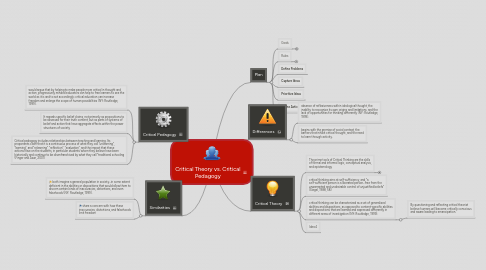Critical Theory vs. Critical Pedagogy
by Brittany John


1. Critical Pedagogy
1.1. would argue that by helping to make people more critical in thought and action, progressively minded educators can help to free learners to see the world as it is and to act accordingly; critical education can increase freedom and enlarge the scope of human possibilities (NY: Routledge, 1999).
1.2. It regards specific belief claims, not primarily as propositions to be assessed for their truth content, but as parts of systems of belief and action that have aggregate effects within the power structures of society
1.3. Critical pedagogy includes relationships between teaching and learning. Its proponents claim that it is a continuous process of what they call "unlearning", "learning", and "relearning", "reflection", "evaluation", and the impact that these actions have on the students, in particular students whom they believe have been historically and continue to be disenfranchised by what they call "traditional schooling (Finger and Asun, 2001)
2. Similarities
2.1. both imagine a general population in society...in some extent deficient in the abilities or dispositions that would allow them to discern certain kinds of inaccuracies, distortions, and even falsehoods (NY: Routledge, 1999).
2.2. share a concern with how these inaccuracies, distortions, and falsehoods limit freedom
3. Plan
3.1. Goals
3.1.1. Goal 1
3.1.2. Goal 2
3.2. Rules
3.2.1. Session Rule 1
3.2.2. Session Rule 2
3.3. Define Problems
3.4. Capture Ideas
3.5. Prioritize Ideas
3.6. Define Action Points
4. Differences
4.1. absence of reflexiveness within ideological thought, the inability to recognize its own origins and limitations, and the lack of opportunities for thinking differently (NY: Routledge, 1999).
4.2. begins with the premise of social context, the barriers that inhibit critical thought, and the need to learn through activity.
5. Critical Theory
5.1. The prime tools of Critical Thinking are the skills of formal and informal logic, conceptual analysis, and epistemology
5.1.1. Sub Idea 1
5.1.2. Sub Idea 2
5.2. critical thinking aims at self-sufficiency, and "a self-sufficient person is a liberated person...free from the unwarranted and undesirable control of unjustified beliefs" (Siegel, 1988, 58).
5.3. critical thinking can be characterized as a set of generalized abilities and dispositions, as opposed to content-specific abilities and dispositions that are learned and expressed differently in different areas of investigation (NY: Routledge, 1999).
5.3.1. By questioning and reflecting critical theorist believe humans will become critically conscious and aware leading to emancipation.
